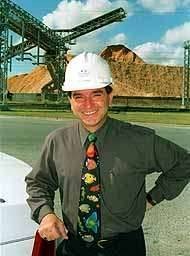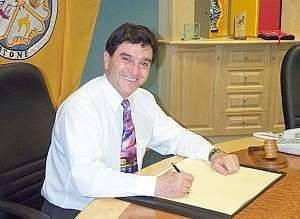Peter Corones

Peter Corones
Mayor
Gladstone Council
From:
http://www.gladstone-online.com.au/council/themayor.htm
[Knowledge of the web-links supplied by Ellena Galtos.]
First elected to council in 1985 as an Alderman for two terms and retired after being appointed General Manager of the Gladstone Area Promotion and Development Ltd.
Gladstone Mayor since 1994
Council Related Activities
Member of the University of Central Queensland Gladstone Advisory Committee.
Director Gladstone Port Authority
Member Gladstone Area Water Board.
Chairman of the Capricornia Regional Electricity Council.
Director of the Gladstone Promotion Bureau.
Member of the Gladstone Economic and Industry Development Board
Elected representative on the Executive of the Urban Local Government Association of Queensland.
Business
Past Gen Manager of the Gladstone Promotion Bureau.
Proprietor of the Barney Beach Caravan Park.
Past State President of the Caravan Parks Assoc.
Past Australian President of the Caravan Parks Assoc.
In Partnership developed the Gladstone Skate & Bowl
Private Interests & Hobbies
Past President of Gladstone South Rotary and is a Paul Harris fellow.
Experimental chef - Mediterranean cuisine.
Proudest achievements
Continuing focus of Council to the Gladstone Region Sustainability Project by joining the CCP which provides a framework for local government to reduce greenhouse gas emissions in their own operations and throughout the community.
Would like to see
The Flinders Parade foreshore precinct development brought forward and ongoing funding to complete the Kirkwood Road project in order to divert heavy traffic from the schools, shopping centres and populated areas within the city streets.

From:
http://thecouriermail.com.au/extras/federation/CMFedFitzCorones.htm
All good things come for the city that waited
By Don Petersen
Move over, Brisbane Lord Mayor Jim Soorley. According to Peter Corones, Brisbane has lost its claim to being Australia's "most liveable city". That now belongs to Gladstone.
"Look out the window," Corones says from the council chambers on one of the few city malls in Australia which seems to work. "See any pollution? No. Only clear blue sky."
Corones, son of a Greek migrant who in the 1930s sold ice cream from the back of a donkey cart, [Use the search engine under Corones to find other relatives of the Mayor, including Harry Corones, mentioned later in this article], was for six years a city councillor and now is in his third term as Gladstone's staunchly independent Mayor.
Fielding questions about the city's past and future, he is enjoying himself and, when it comes to hyperbole, he's a match any day for Soorley.
Still, his claim at first seems unbelievable, mischievously outrageous.
Along with Newcastle, Wollongong and WA's Bunbury, Gladstone is supposed to be an industrial town, gritty-eyed, grime under its fingernails, smokestacks dominating the foreshores of its deepwater harbour, Port Curtis.
"The thing is," he says, "we are a 'model' industrial city, balancing industry and the environment. And we don't have the huge volume of traffic that causes the nasties in Brisbane. In fact, in terms of air quality, we are three times cleaner than Brisbane."
Corones does not bother searching for material to verify this. The sky is, after all, very blue and you get the feeling that he views Brisbane's status as capital of Queensland as spurious anyway. Queen Victoria named Port Curtis as the capital of Northern Australia at a time when Moreton Bay was still a tiny penal colony.
It is not hard to see why he's a blood relative to the penniless Harry Corones, who in 1924 turned an outback pub, the Corones Hotel in Charleville, into the then glamorous social hub of western Queensland's squattocracy.
Now 50, Peter Corones was growing up – head prefect and winner of high school leadership awards – when Gladstone was getting over its first great boom, the establishment of the Comalco alumina refinery in the early 1960s.
And since then he has grown with the city, combining a successful career in small business with community service in local government. Name a local club, board, bureau or committee and he seems to have been on it, careful always to avoid politics.
"Where party politics have a role in local government you see the most conflict," he says. "Here we are all independents, not Liberals or Laborites ganging up on one another. And it works, the city benefits."
The other plus, he adds, is that the population explosion – 8000 to 35,000 since the 1960s – has brought a lot of new people in, the first generation now settling into retirement, their children taking up the reins.
"Elsewhere, older families tend to dominate community life," Corones says. "Not here. When we began to build this city in the 1960s we came from everywhere in Australia and overseas and people can see the rewards.
"We are the city that waited." He's honest enough to confess that historian Lorna McDonald coined the description. But he has plenty of his own and they give credit where it is due.
On Gladstone's incredible growth: "The port shaped the new era. It was brought about by visionaries like Harbour heads such as Bill Golding and Martin Hansen. Without the hard decisions they made the refinery and smelter would not be here, nor would the state's biggest power station or coal exports snowballing at millions of tonnes per annum.
"There is also the 'can do' factor. We have heaps of it."
On the role of local government: "Many of today's governments look only at three-year terms and so ignore the infrastructure needs of much longer. Fifty-year plans should be absolutely mandatory so local government can borrow money, spreading the load over the longest period of time, to build the kind of infrastructure that makes things happen.
"We are not private enterprise, in it only for the quick profit."
On pollution problems, inherent in an industrial city: "We have learned from other places like Newcastle. We have the technology to reduce emissions and are developing an air shed model to tell us where to put new industries so we don't clutter the environment. This has to be a place where people can live in a clean, healthy environment, where they have diversity of employment and lead full lives. This will be the model industrial city for the 21st century, a place of harmony between lifestyle and job opportunity."
The future: "We will be the light metals capital of the Pacific rim, building the bits for new-generation cars, planes and rockets – the Technopolis of tomorrow. I am one of 38 mayors from around the world who sits on the board of the World Technopolis Association which is designed to commercialise the skills of today, those being developed in our universities.
"It is the kind of thing that will reverse our dependence on overseas technology and put Australia back on its feet."
On the regions: "I keep telling Peter Beattie that the Queensland capital should be where the greatest wealth is created. That's here. But do we really need state governments? I think that if the regions clustered up and worked together we could do without them.
"At the moment we are working with Rockhamption to do more to complement one another. We are only an hour apart. They have an international airport, we have one of the biggest ports in the nation. Many of our activities are complementary. The future is working together rather than indulging in destructive rivalry."
Before the lesson endeth there is one more point, delivered with a huge smile: "I would remind Jim Soorley that it is the black gold from our region that provides Brisbane with so many facilities, like its urban train network. Yet Central Queensland has the only rail services that are profitable."